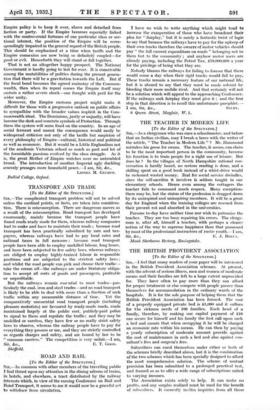TRANSPORT AND TRADE [To the Editor of the Srucrsvon.] Sin,—The
complicated transport problem will not be solved unless the cardinal points, or facts, are taken into considera- tion. There is misconception. There are dangerous moves as a result of the misconception. Road transport has developed enormously, mainly because the transport people have found roads ready made for them, whereas railway companies had to make and have to maintain their roads ; because road transport has been practically subsidized by rate and tax- payers, whereas railways have had to pay local rates and national taxes in full measure ; because road transport people have been able to employ unskilled labour, long hours, and have been subjected to few safety laws, whereas railways are obliged to employ highly-trained labour in responsible positions and arc subjected to the strictest safety laws ; and whilst the road people can pick and choose their traffic— take the cream off—the railways are under Statutory obliga- tion to accept all sorts of goods and passengers, profitable or unprofitable.
But the railways remain essential to most trades—par- ticularly the coal, iron and steel trades—and no road transport is likely to be able to deal with more than a fraction of such traffic within any measurable distance of time. Yet the comparatively- unessential road transport people (including pleasure motorists) are favoured by ready-made roads, roads maintained largely at the public cost, publicly-paid police to signal to them and regulate the traffic; and they may be unskilled or careless, they have few or no really strict safety laws to observe, whereas the railway people have to pay for everything they possess or use, and they are strictly controlled as regards charges and safety, and are bound by law to be " common carriers." The competition is very unfair.—I am,






































 Previous page
Previous page